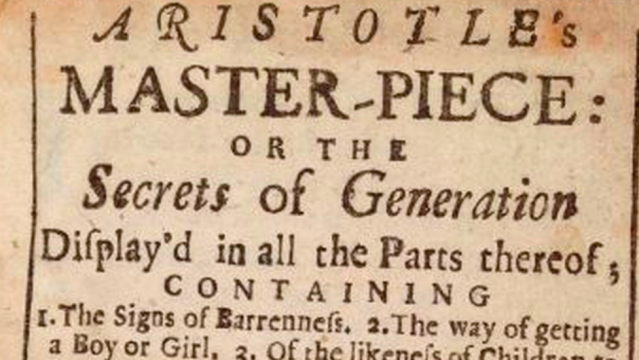People have always wondered about sex, and as literacy became more widespread over the course of the 17th century in England, books appeared to feed that curiosity.
One of the most popular was Aristotle’s Complete Masterpiece, first published in 1684, and republished and repackaged in scores of editions through at least the 1850s. Needless to say, the book was not by Aristotle; the unknown author simply used that name to make the book seem more legitimate. Aimed at the new mass market of readers, the text mixes “facts about the body” compiled from earlier books with folk knowledge and wild rumours.
It was a popular “marriage manual” — more for its information about male and female sexual anatomy and the progress of pregnancy than for any explicit description of intercourse. Presumably, the author thought you could figure that out for yourself.
Here’s a sample:
On conception — in which the author sets forth the then-wild idea that both sexes have something to do with making a baby:
Man consists of an egg, which is impregnated in the testicles of the woman, by the more subtle part of the man’s seed; but the forming faculty and virtue in the seed, is a divine gift, it being abundantly endued with a vital spirit, which gives sap and form to the embryo…
On female anatomy — in which the author shows that, yes, people did know the clitoris was for before 1964:
The clytoris is a substance in the upper part of this division where the two wings concur, and it is the seat of venereal pleasure, being like a yard in situation, substance, composition, and erection; growing out of the body sometimes two inches, but that never happens unless through extreme lust or extraordinary accidents.
You can read it yourself: several editions are available online. [Aristotle’s Complete Masterpiece, Porter and Teich 1994, Fissell 2003]
